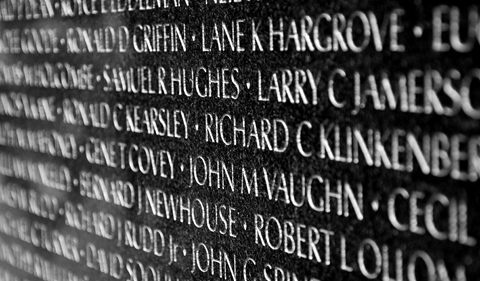
Names of Vietnam war casualties on Vietnam War Veterans Memorial in Washington DC, USA. Names in chronological order, from first casualty in 1959 to last in 1975.
by Kristin M. Distel
“I have always enjoyed history as a story, not as a list of names and dates,” says Benjamin Rottersman. “I’m interested in first-person narratives especially.” Rottersman notes that since he was a child, he has wanted to learn why particular events, such as wars and other international conflicts, have occurred.
“Skills that we practice in my majors are useful. I practice those skills every day, and I’m getting better at it,” says Rottersman, a senior in History and Philosophy.
Rottersman completed an internship with the Southeast Ohio History Center during the Fall 2016 semester, along with volunteering at the Columbus Historical Society during Summer 2016. He had to apply for the Southeast Ohio History Center internship and was one of only two interns who were selected.
He found that his internship and volunteer experience, both of which emphasized oral history, helped him understand such events more deeply and meaningfully.
Preserving the Accounts of Vietnam Veterans
Rottersman notes that the Columbus History Society is currently working on two projects, both of which are grant-funded. The first project allows volunteers to interview soldiers who identify as LGBTQ and served before the implementation of the “don’t ask, don’t tell” policy. Rottersman praises the society’s diverse focus and its dedication to memorializing these voices.
The second project, which is a joint effort with the University of Kentucky, focuses on preserving the first-person accounts of Vietnam War veterans.
This latter project was Rottersman’s area of focus during his time with the Columbus Historical Society.
“The emphasis on oral history is fantastic,” he notes. “When you’re reading a book or watching a movie about the Vietnam War, you get only a general feeling of what that experience was like. It’s vague. But hearing someone talk about the war from a first-person perspective, to watch their facial expressions, it’s incredible,” he says.
“These veterans show us their scars, and they often have visible injuries. This affects both how history is told and how we remember it. There is a drastic split between what we think the Vietnam War was like and what it was really like.” Rottersman found that his work with the Columbus Historical Society illuminated the difference between myth and reality.
“I had two jobs with the Columbus Historical Society,” he explains. “I helped with prep work for the upcoming oral history interviews, and I analyzed the interviews for metadata. If I had to compare my work to something that most students are familiar with, I’d say that it was like writing Sparknotes for the interviews. I asked myself, ‘If a scholar were doing research, what would he or she need to know? What keywords would be useful?’ In this way, it was similar to creating an index.”
Using Skills Gained at OHIO
Rottersman found that his dual majors in history and philosophy provided invaluable skills and preparation for his internship and volunteer experiences.
“My majors especially emphasize critical thinking, close analysis, and problem-solving. We learn how to organize information and how to make that information usable and meaningful for a general audience.”
These proficencies aligned perfectly with the work Rottersman performed in both his internship and his volunteer work.
These experiences also refined Rottersman’s interest in personal narrative and its role in the preservation of history. “Before my work with the societies, I didn’t know much about oral history, but it really is of historical importance. It’s legitimate.”
He notes that oral storytelling is becoming increasingly vital because of the advancing age of some veterans.
Opportunities for Involvement
In addition to honing his own skills and interests, Rottersman also learned about the usefulness and flexibility of his degree.
“I want students to know that with a bachelor’s degree in history, you can do more than teach or work in a museum. There’s more to a history degree than most people think. In these projects, the emphasis is not just on history but the skills you’re using to interact with history.”
Rottersman emphasizes that there are plenty of opportunities for others who are interested in the Vietnam War to become involved in the Columbus Historical Society’s project. He notes that in working with the University of Kentucky to preserve Vietnam veterans’ accounts, the volunteer team is still writing code for the analysis of data.
“You don’t need audiovisual experience or an advanced history degree to become part of the team,” he states. Even basic familiarity with iPhones and computers is sufficient,” Rottersman notes. “It’s easy to participate in this project, and we need new bodies.”
Bringing Research Skills Back to Athens
Rottersman brought the skills and knowledge he developed at OHIO and at the Columbus Historical Society to his internship with the Southeast Ohio History Center. He notes that he truly enjoyed learning about the efforts to preserve the rich history of Athens.
“In learning about Athens, you feel that history is alive. Events that occurred even 60 years in the past seem current. We’re lucky at OHIO because the professors who teach here know the history of Athens. To me, this means that we can become really connected to the city, and talking with a veteran on campus or uptown takes on new meaning. Their stories contain valuable information that we should be preserving. The stories they’re telling are new oral histories, and this type of preservation is growing. It’s young. It’s exciting that their stories still being recorded.”



















Comments